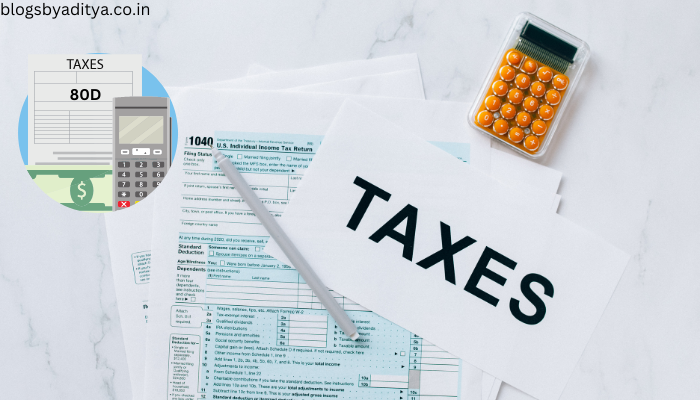What is Section 80D?

Section 80D of the Income Tax Act, 1961 is a tax deduction provision that allows taxpayers to claim a deduction from their taxable income for medical expenses incurred by them or their family members. This deduction is available for both preventive and curative medical expenses.
Deductions under Section 80D
The amount of deduction available under Section 80D depends on the age of the taxpayer and the nature of the medical expenses incurred.
Deductions for taxpayers below 60 years of age:
Self and family: Taxpayers below 60 years of age can claim a deduction of up to ₹25,000 for medical expenses incurred for themselves and their family members.
Parents: In addition to the above deduction, taxpayers can also claim a deduction of up to ₹25,000 for medical expenses incurred for their parents.
Deductions for taxpayers aged 60 years and above:
Self and family: Taxpayers aged 60 years and above can claim a deduction of up to ₹50,000 for medical expenses incurred for themselves and their family members.
Parents: In addition to the above deduction, taxpayers can also claim a deduction of up to ₹50,000 for medical expenses incurred for their parents.
Deductions for medical expenses incurred for persons with disabilities:
Taxpayers can claim a deduction of up to ₹75,000 for medical expenses incurred for persons with disabilities.
Deductions for health insurance premiums:
Taxpayers can claim a deduction of up to ₹25,000 for health insurance premiums paid for themselves, their spouse, and their children.
Taxpayers aged 60 years and above can claim a deduction of up to ₹50,000 for health insurance premiums paid for themselves, their spouse, and their children.
Deductions for preventive health check-ups:
Taxpayers can claim a deduction of up to ₹5,000 for preventive health check-ups.
Tax-related information
The deduction under Section 80D is available only for medical expenses incurred in India.
The deduction is available only for medical expenses that are actually incurred and paid during the financial year.
Taxpayers must submit documentary proof of medical expenses to claim the deduction.
The deduction under Section 80D is subject to certain conditions and limitations. Taxpayers should consult with a tax professional to ensure that they are claiming the deduction correctly.
Additional Information on Section 80D Deductions Specific Medical Expenses Covered Section 80D covers a wide range of medical expenses, including:
Hospitalization expenses: Room rent, nursing charges, doctor’s fees, surgical expenses, etc.
Medicines and drugs: Prescribed medications, medical supplies, etc.
Medical tests and diagnostics: X-rays, MRIs, CT scans, blood tests, etc.
Dental treatments: Fillings, extractions, braces, etc.
Ayurvedic and homeopathic treatments: Expenses incurred for treatments from qualified practitioners.
Rehabilitation expenses: Expenses for devices or therapies to aid in recovery from disabilities or illnesses.
Important Considerations
Reimbursement: If your employer reimburses your medical expenses, you cannot claim a deduction under Section 80D for the reimbursed amount.
Deduction Limits: The maximum deduction allowed under Section 80D is subject to certain limitations based on your age and the nature of the medical expenses.
Documentation: To claim the deduction, you must provide documentary proof of your medical expenses, such as bills, receipts, and prescriptions.
Health Insurance Premiums: The deduction for health insurance premiums is available even if you have not incurred any medical expenses during the year.
Preventive Health Check-ups: The deduction for preventive health check-ups is available only if the check-up is conducted by a recognized medical institution.
Tax Planning Tips
Maximize Deductions: If you have significant medical expenses, consider purchasing a health insurance policy with a high sum insured to maximize your deduction.
Plan for Future Expenses: If you anticipate high medical expenses in the future, start saving or investing to accumulate funds that can be used to pay for these expenses.
Consult with a Tax Professional: For complex tax situations or to ensure you are claiming the maximum deduction allowed, it is advisable to consult with a tax professional.
Additional Tax Deduction Benefits: A Comprehensive Guide
Beyond Section 80D, there are several other tax deduction benefits available to Indian taxpayers. These deductions can significantly reduce your taxable income and, consequently, your tax liability.
Deductions for Investments and Savings
Section 80C: This is perhaps the most well-known deduction, allowing taxpayers to claim a deduction of up to ₹1.5 lakh for investments in various financial instruments. These include:
- Life insurance premiums
- Public Provident Fund (PPF)
- National Savings Certificates (NSC)
- Equity Linked Savings Schemes (ELSS)
- Sukanya Samriddhi Yojana (SSY)
- Tuition fees for children
Section 80D: This section has already been discussed in detail.
Section 80E: Deduction for interest on education loans is available under this section. The maximum deduction allowed is ₹1.5 lakh per year.
Section 80EE: This section provides a deduction of up to ₹1.5 lakh for interest on a home loan taken for the first-time purchase of a residential property.
Deductions for Donations and Charitable Contributions
Section 80G: Taxpayers can claim a deduction for donations made to eligible charitable institutions. The deduction percentage varies based on the nature of the institution.
Section 80GGA: This section allows for a deduction for donations made to political parties. - Deductions for House Property
Section 80I: Deduction for income from newly constructed residential houses is available under this section.
Section 80IA: This section provides a deduction for income from industrial undertakings in specified backward areas.
Section 80IBA: This section offers a deduction for income from industrial undertakings in specified special economic zones (SEZs).
Deductions for Other Expenses
Section 80GG: This section provides a deduction for house rent paid by salaried individuals who do not own a house.
Section 80TTA: Deduction for interest earned on savings bank accounts is available under this section.
Section 80TTB: Deduction for interest earned on fixed deposits by senior citizens is available under this section.
Section 80TTD: Deduction for pension income received by senior citizens is available under this section.
Section 80U: Deduction for disability benefits is available under this section.
Additional Tips for Maximizing Tax Deductions
Plan Ahead: Start planning for your tax deductions well in advance to ensure you make the most of the available opportunities.
Consult with a Tax Professional: If you have a complex financial situation or are unsure about the best tax strategies, consulting with a tax professional can be beneficial.
Stay Updated: Tax laws and regulations can change frequently. Stay informed about the latest updates to ensure you are claiming all eligible deductions.
Consider Long-Term Investments: Many of the tax-saving investments, such as PPF and ELSS, offer long-term benefits in addition to tax deductions.
Utilize Digital Platforms: Several online platforms and mobile apps can help you track your investments, expenses, and potential deductions.
By understanding the various tax deduction benefits and planning accordingly, you can significantly reduce your taxable income and increase your overall financial well-being. Remember, it’s essential to consult with a tax professional for personalized advice based on your specific circumstances.


